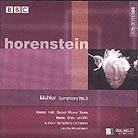April 2000
On March 20, 1959, a cold, wet, Friday evening, Jascha Horenstein walked onto the stage of the Royal Albert Hall in London to face what he described as "the biggest artistic challenge of my career." Horenstein was about to conduct, for the first (and, as it turned out, only) time in his life, Mahler's Eighth. Not only was this the first time Horenstein had conducted the work, but the schedule for the hall was so congested that he hadn't even been able to conduct the dress rehearsal in the actual venue itself. To say that Horenstein's performance was a triumph would be an understatement. Many have pointed to that one evening (and its capacity audience of 6000) as the event which kick-started the Mahler revival in Britain. Few recordings attain classic status soon after issue; still fewer have attained it years before officially appearing on the market. This is the exception, and for some time there has been a vocal minority (guilty) familiar with the performance from pirate LPs, insisting that when Horenstein's Eighth finally appeared, it would sweep the field. Now it has finally appeared as part of the first release from perhaps the world's greatest library of recorded sound, the BBC Sound Archives. Appeared, moreover, in astonishingly good sound. Even the BBC's own rebroadcast in 1997 (itself a huge improvement over the pirates) left me unprepared for the success of the remastering job done here. But the performance! The Mahler symphony is perhaps more difficult to "get right" than any other with its weird admixture of Latin hymn (the Veni, Creator Spiritus, that forms Part I) and German mysticism (Part II is a setting of the closing scene of Goethe's Faust). Welding the two parts into a satisfying whole is something very few conductors have ever, in my experience, done convincingly. Perhaps Horenstein's Part I is slightly underpowered compared with other recordings, although this means that he is able to make the close of the work (which so often sounds flat) sound more impressive and overwhelming than the end of Part I. I would venture to suggest that those recordings that do overwhelm in Part I tend to distinctly underwhelm at the close of the whole work. Moreover, Horenstein finds great lyricism in Part I (just listen to some of the phrasing!), lyricism missed by many other performances where the conductor concentrates on the undoubted excitement and sheer physicality of the sound produced by the massed forces. Horenstein's great triumph, though, is his seamless direction of Part II. From the tense expectancy of the hushed opening to the final huge crescendo of the Chorus Mysticus, the music unfolds like a single massive paragraph, sublime and majestic. The solo teams are good if not outstanding (Solti probably has the best vocal lineup of all); the chorus (practically every notable choir in London was involved) and the children's choir are excellent. This recording is not for you if you either insist on first-class sound to the exclusion of all other considerations or if the occasional inevitable flub in live performance (a particularly unfortunate trumpet clam at the opening of the coda of Part I, for instance) bothers you too much. But for everyone else, I'd suggest that this is the Mahler Eighth. GO BACK TO: |
 Jascha Horenstein - Mahler
Jascha Horenstein - Mahler![[Reviewed on CD]](../format/regcd.gif) Gustav
Mahler's Symphony No.8 was composed at breakneck speed in the summer of 1906, but it
wasn’t performed until September 1910. Its premiere in Munich was attended by many of
the leading artistic figures of the time, and it was a triumph -- the greatest triumph of
Mahler's entire life as a composer. Nine months later, Mahler was dead. The work has
always posed problems -- of economics, of coordination and, perhaps above all, of
interpretation. The ultimate recording of the Eighth was something searched for but never
found. Until, perhaps, now.
Gustav
Mahler's Symphony No.8 was composed at breakneck speed in the summer of 1906, but it
wasn’t performed until September 1910. Its premiere in Munich was attended by many of
the leading artistic figures of the time, and it was a triumph -- the greatest triumph of
Mahler's entire life as a composer. Nine months later, Mahler was dead. The work has
always posed problems -- of economics, of coordination and, perhaps above all, of
interpretation. The ultimate recording of the Eighth was something searched for but never
found. Until, perhaps, now.